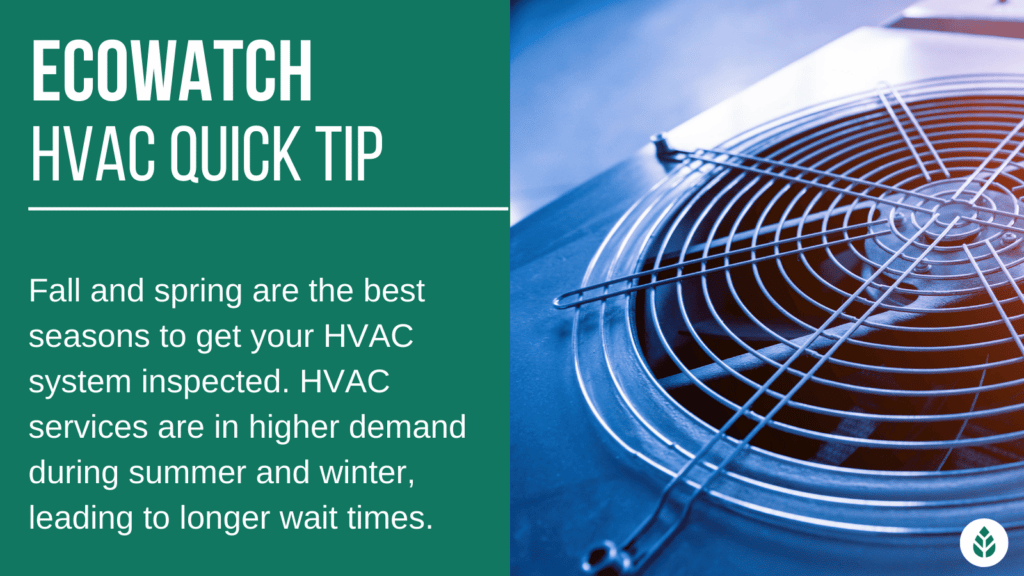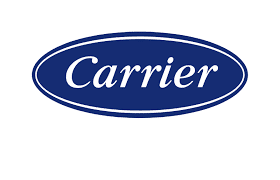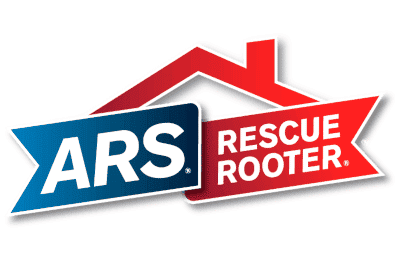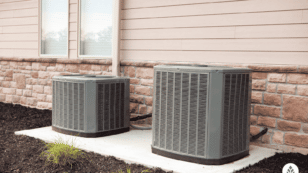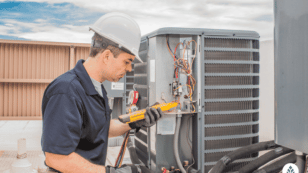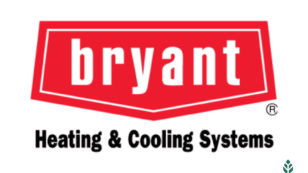
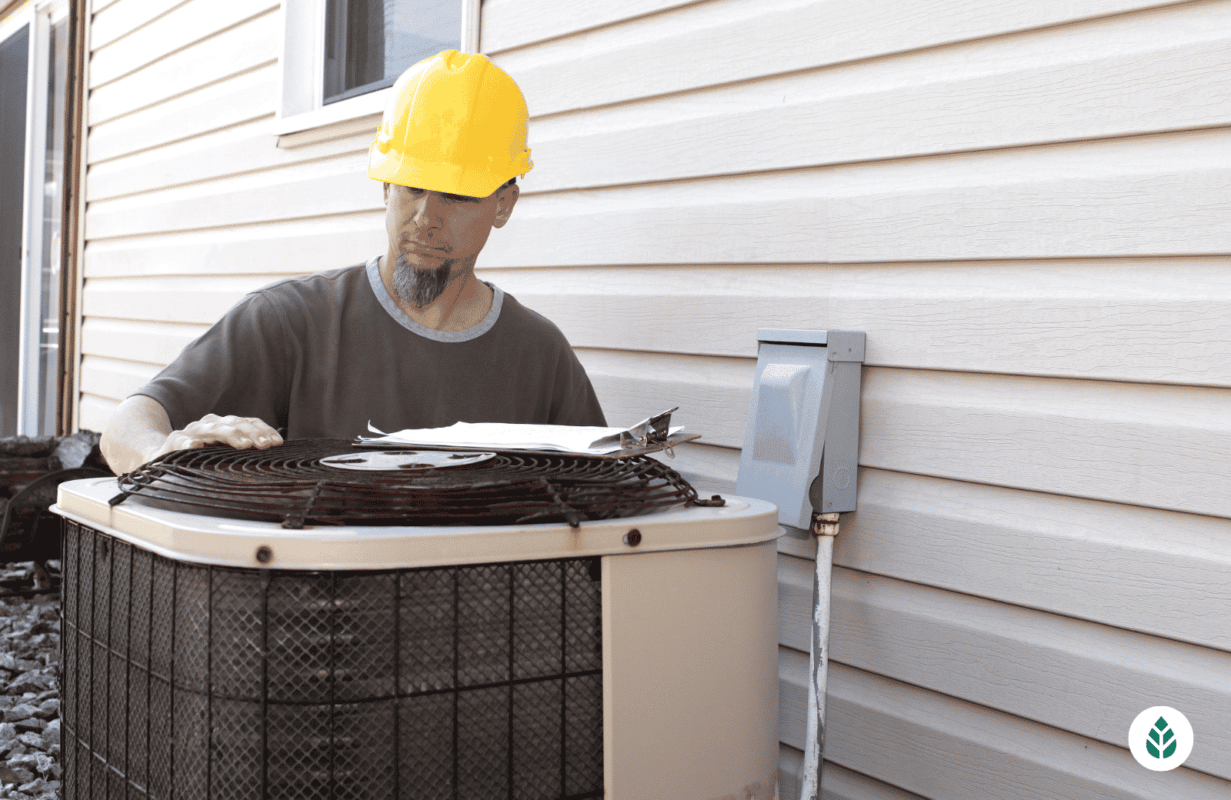
HVAC Inspections: What to Expect and Costs
In this homeowners guide to HVAC inspections, we’ll answer:
- What is an HVAC inspection?
- What does an HVAC inspection entail?
- Why are HVAC inspections important?
- How much does an HVAC inspection cost?
Each product and or company featured here has been independently selected by the writer. You can learn more about our review methodology here. If you make a purchase using the links included, we may earn commission.
A Homeowner’s Guide to HVAC Inspection
HVAC inspections are an important part of maintaining your heating, ventilation, and air conditioning (HVAC) units. Preventative HVAC service entails cleaning and inspecting your heating and AC systems to keep them in working order to ensure a longer lifespan for your HVAC unit and prolonging the need of a new, often costly, system.
Regular maintenance extends the lifespan of your HVAC and allows you to catch problems early, giving you the peace of mind that your heating and cooling systems will run smoothly year-round.
What Is an HVAC Inspection?
HVAC inspections are a routine part of maintaining your home. Regular HVAC inspections help your heating and cooling units run efficiently, keeping your home comfortable.
At its best, neglecting your HVAC system will increase your energy bills and lower the energy efficiency of your home. At its worst, it can also lead to costly, unanticipated repairs.
The UN has reported inefficient air conditioning systems as a significant contributor to global warming pollution. And yet, research shows that 70%–90% of HVAC systems are running inefficiently due to poor installation or lack of maintenance.1
Annual or bi-annual HVAC inspections are the quickest and easiest way to make sure your system is running as efficiently as possible.

Carrier Heating and Cooling
Pros
- Wide availability (25+ states)
- Focus on energy efficiency
- Transparent about environmental impact
- Industry-leading company
Cons
- Weak or non-existent warranty
- More expensive than some competitors

ARS Rescue Rooter
Pros
- Focus on energy efficiency
- Positive customer reviews
- 15+ years in business
- Outstanding social impact
- Strong warranty
- Offers eco-home systems (heat pumps, solar, etc)
- Financing options available
Cons
- Available in fewer than 25 states

Service Experts Heating
Pros
- Wide availability (25+ states)
- Positive customer reviews
- 15+ years in business
- Outstanding social impact
- Strong warranty
- Offers eco-home systems (heat pumps, solar, etc)
- Offers money-saving membership programs
Cons
- No emergency service
Why Should You Get an HVAC Inspection?
Annual HVAC inspections are an important part of maintaining your heating and cooling systems. Regular inspections not only help your HVAC system run more efficiently, but they can also identify and prevent larger issues down the road.
During an HVAC inspection, your technician will replace your air filter, clean the system components, lubricate moving parts and check for other problems. This basic HVAC tune-up will keep your system running efficiently and prevent breakdowns.
How Much Does an HVAC Inspection Cost?
A routine HVAC inspection will typically cost you $75–$150. That being said, the size and type of equipment you have can drive these prices up.
Hiring a professional to inspect your equipment can extend the life of your HVAC system. Regular inspections may seem like an unnecessary expense, but they are far cheaper than an HVAC replacement, which typically costs between $5,000 and $10,000.
What Does An HVAC Inspection Entail?
Most HVAC systems have several units. In most cases, your HVAC system will include a heat pump or separate air conditioning and furnace units. These systems have indoor and outdoor components, as well as ductwork throughout the walls of your home.
It’s best to have your heating system inspected in early fall and your cooling system inspected in the early spring in preparation for each season. Alternatively, you can have your entire system inspected once a year. You should also have your HVAC inspected if your HVAC warranty is set to expire soon.
Before your inspection, discuss the process with a licensed HVAC technician. They can give you individualized advice on how to maintain your system and how frequently it needs to be serviced.
You can watch this video for more details on what to expect from an HVAC inspection.
Furnace Inspection Checklist
When inspecting your heating system, your HVAC technician will perform basic safety and performance checks:
- Calibrate thermostat
- Inspect safety controls
- Test for gas and carbon monoxide leaks
Your technician will also inspect these components of your furnace for signs of damage, age, or defects:
- Furnace cabinet
- Electrical components
- Blower wheel
- Ignitions
- Exhaust Venting
- Heat Exchanger
Air Conditioning Inspection Checklist
When inspecting your air conditioner, the most important components that your HVAC technician will check are:
- Refrigerant levels
- Electrical connections
- Evaporator Coil
- Drain Pan
- Condensation Line
- Outdoor condenser & blower fan
Airflow Inspection
An airflow inspection can help improve the air quality in your home and improve the efficiency of your air conditioning. During an airflow inspection, your HVAC technician will check for duct leaks and test for proper airflow.
These inspections will help you identify issues with your air conditioning system that could be hindering airflow. That includes dirty air filters or cracked or blocked ductwork.
After Your HVAC Inspection, What to Expect
After your HVAC technician has completed the entire inspection checklist for your particular HVAC unit, they will create an inspection report.
HVAC contractors create inspection reports to record important details about the state of your HVAC and recommend further action, if necessary.
For instance, if you need an HVAC repair beyond what they can easily complete during the inspection, your HVAC contractor will detail what your next steps should be in the inspection report.
If your HVAC technician determines that you need further repairs or an HVAC replacement, set a new time and date to have a technician return and complete the necessary work,
If you’d like to get connected with an HVAC professional, select one of our top providers below to get a free estimate.
Common Problems Found in HVAC Inspection
Routine HVAC inspections can uncover any number of issues with your HVAC system. Because your HVAC units have so many components, there are many things to look out for. Here are some of the most common problems HVAC technicians find during HVAC inspections:
- Gas line leak: A cracked heat exchanger or other damaged equipment can cause a leak in your furnace’s gas line. This can be a result of poor airflow to your system, which can be prevented with regular maintenance.
- Exhaust venting problems: Snow, leaves, branches, rust or other damage can block your furnace’s exhaust vent. This can stop your furnace from heating or shut your system down entirely. You could also be at risk of carbon monoxide poisoning if this issue is left unresolved.
- Dirty or clogged filters or evaporator coil: If your evaporator coil or air filters are dirty or clogged, your HVAC will be working inefficiently. Air will be drawn through slowly and with more difficulty.
- Cracked or leaky ductwork: Cracked ductwork is the fastest way to lose a significant amount of air in your HVAC system, drastically reducing the efficiency of your system.
- Faulty wiring: Faulty wiring in your HVAC can trip your breaker and cause your system to keep shutting off. Electrical issues can cause significant damage if left unattended.
- Undercharged or overcharged refrigerant: Too much or too little refrigerant will prevent your AC system from cooling properly. The pressure in your AC will be off-balance, putting strain on your compressor and AC unit.
- Aging HVAC system: If your HVAC system is getting old and keeps needing repairs, it may be time to replace it. Your HVAC technician can advise you on the best time to do this.
Choosing an HVAC Inspector
Reputable HVAC companies are well-seasoned experts when it comes to inspections. When you’re deciding which HVAC inspector to go with, we recommend looking for the following:
- Long-standing reputation: How long has the company been in business? Are they known for quality work? A little research can help you determine which companies are dependable.
- Positive online reviews: Check if the HVAC company you’re considering is BBB accredited and has positive reviews on trusted websites.
- Local service: Of course, you’ll want to double-check that the company you choose offers service in your area and is qualified to work on the type of equipment you have.
- Fair pricing: Do your research and call around for information about pricing and services. When comparing prices, consider what is included in the inspection (will they replace your air filters? Will they clean and inspect your HVAC equipment? Will they perform repairs as necessary?).
If you’d like to get connected with an HVAC professional, select one of our recommended providers below to get a free quote:
FAQ: HVAC Inspections
A typical HVAC inspection takes about an hour. If you have a larger system or need additional routine work (like replacing the refrigerant), it may take longer.
HVAC Inspections are intended to perform basic maintenance and identify any larger issues with your system. If your system is malfunctioning, needs a new part, or has to be replaced entirely, your HVAC technician may ask to schedule service for another day.
We recommend that you get your HVAC system inspected at least once per year. Fall and spring are typically the best seasons to do so when HVAC services are in their lowest demand.
Compare HVAC Inspection Companies
-
- Wide availability (25+ states)
- Focus on energy efficiency
- Transparent about environmental impact
- Industry-leading company
- Weak or non-existent warranty
- More expensive than some competitors

 233k
233k  41k
41k  Subscribe
Subscribe 
